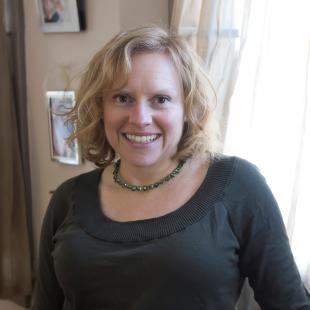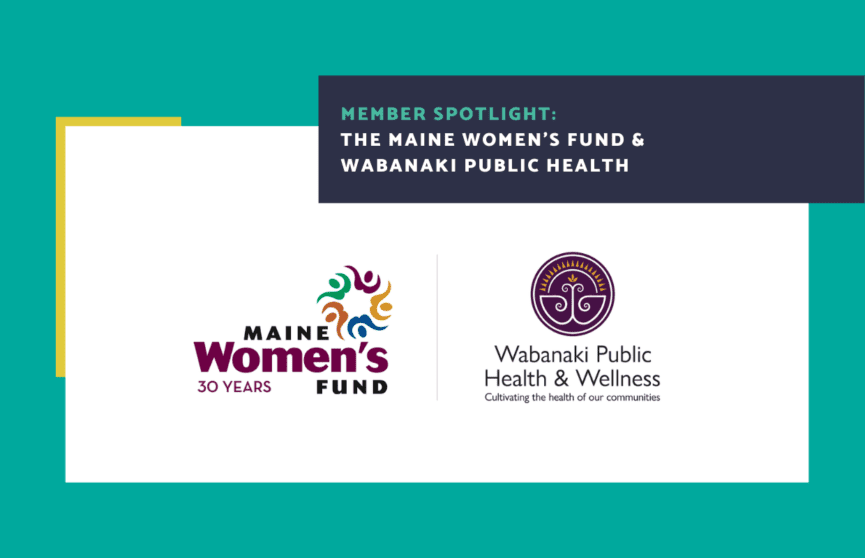Women’s funds and foundations recognize the critical need to act with urgency to support Indigenous women and girls. This #GivingTuesday, we honor Native American Heritage Month, shining a spotlight on a WFN member, The Maine Women’s Fund (MWF), and their collaboration with Wabanaki Public Health and Wellness (WPHW) — a tribal organization that delivers public health services to the five tribal communities in Maine.
Investing in Indigenous Communities

In 2020, the Women’s Funding Network, in partnership with the Bill & Melinda Gates Foundation, created the Women’s Economic Mobility Hub, a new initiative to invest in 9 regional women’s funds and foundations across the country who were experimenting with place-based models to increase economic mobility for women and their families.
As part of our initiative to develop an Economic Mobility Hub in Maine, WFN invested in the Maine Women’s Fund, who partnered with Wabanaki Public Health & Wellness to develop culturally responsive supports for Indigenous women and their communities.
Watch this video to learn more about the Wabanaki Economic Mobility Hub.
Challenges and Opportunities in Maine
There are four tribes in Maine collectively known as the Wabanaki, but there was no central hub for Wabanaki women from all tribes to connect, share knowledge, concerns, and learn from each other.
Maine ranks ninth nationally for food insecurity and first in New England. In addition, there have been roughly 50 overdose deaths a month in Maine during COVID — a 30% increase.
The Wabanaki Hub seeks to integrate mainstream and cultural frameworks that are founded on tribal community values, perspectives and priorities to improve access to food, healthcare, and other needs for local tribal communities.
While the challenges were many, the opportunities to collaborate around locally sourced and indigenous-led solutions were strong. The Maine Women’s Foundation leveraged their statewide convening power to engage other funding, government, and nonprofit leaders to participate in the initiative, ultimately resulting in deep and lasting community impacts.
This virtual site visit to Maine shows the power of their collective work in action.
The Lasting Impacts of our Collective Investment
The first step of the initiative was to listen for what Indigenous women need. Because state data sets do not well reflect Indigenous people, WPHW started by generating their own data–the traditional Indigenous way, through storytelling. They created women’s circles, safe cultural spaces where women share their stories, make regalia with each other, and dream about the possibilities for the future. Through the women’s circles, WPHW identified the needs that would form the basis of new programs.
The Wabanaki Women’s Economic Mobility Hub grant contributed to several concrete services that are supporting healing for Indigenous women, their families and communities:
- An Indigenous place for child care services–child care was identified as the #1 need in the women’s circles
- A community farm where people can connect with the earth and grow vegetables–increasing food sovereignty and food security
- Guided trips to healing places like Mt. Katahdin and the sacred Penobscot River
As a result of the WEMH initiative, Wabanaki Public Health just recently opened the first Center for Wabanaki Healing & Recovery, which puts culture, ceremony, language, and traditions at the heart of the recovery journey. This community health center is laying the foundation for recovery initiatives, food sovereignty, and access to clean water, because tribal communities must have access to basic resources and be healthy to thrive.
In addition, Wabanaki Public Health and Wellness has been able to leverage significant new funding this past year, so much so that they have doubled their staff and are in the process of creating a whole community of Wabanaki recovery centers.
38 partnerships across multiple sectors
1,452 women and 936 children impacted
$954,604 leveraged
Meet the Leaders
Thanks to the strength of a relationship built over the last 10 years, when Kimberly Crichton of the Maine Women’s Fund and Lisa Sockabasin of Wabanaki Public Health and Wellness heard about $95,000 grants available from the Women’s Funding Network, they decided to apply together. Kim and Lisa won the grant and launched the Wabanaki Women’s Economic Mobility Hub together as part of our nationwide initiative to invest in women’s economic mobility.
After suggesting Lisa Sockabasin, their Wabanaki Public Health and Wellness lead partner, as a key resource on issues facing the tribes in discussions about policy, funding, needs, and assets, in the philanthropic, nonprofit and advocacy community, her expertise has been recognized at organizations like the Maine Philanthropy Center, where she is a member of their board and advocacy committee.
Lisa Sockabasin has led Wabanaki Public Health to grow at the speed of a startup
Lisa Sockabasin

Co-Director, Wabanaki Public Health and Wellness
Lisa Sockabasin is a citizen of the Passamaquoddy Tribe at Motahkomikuk with extensive experience and expertise in Tribal, State, and Federal governments, non-profits, and philanthropic organizations. In her capacity as the Co-Director of Wabanaki Public Health and Wellness, Lisa collaborates with tribal leadership, the Wabanaki Public Health team, and philanthropic partners to address systemic inequities experienced by Wabanaki communities in Maine and to develop and implement culturally-based programs that respond to the needs of our communities.
Lisa’s has over 19 years of experience addressing inequities experienced by and providing opportunities to tribal populations. Prior to joining WPH Lisa served as the Director of the Office of Health Equity in the Maine Department of Health and Human Services, as an epidemiologist in the Infectious Disease Program for the State of Maine, as a nurse epidemiologist with the North American Indian Center of Boston, Inc., and served as coordinator to Harvard’s Four Directions Summer Research Program – a capacity she still serves in.
Kimberly Crichton

Executive Director, Maine Women’s Fund
Kimberly is the Executive Director of the Maine Women’s Fund. She joined the staff of the MWF as the Grants Director in 2017, having previously served as a contracted Grants Coordinator since 2013. She learned about the Maine Women’s Fund, and philanthropy, as a participant in the New Girls’ Network in 2003-2004. As a result of that experience, she became interested in philanthropy, and how funders and non-profits can best work together to achieve their missions and advance lasting change, and she is thrilled to be a part of that change. In 2012, after nine years designing, developing, and managing grant programs at the Maine Health Access Foundation, she founded her own business, Transform. LLC, focused on advancing social change.
About the Maine Women’s Fund
The Maine Women’s Fund has consistently and continually advocated with passion to help ensure that tribal voices and perspectives are included in other foundation’s thinking about their own work. Since 1989, the Maine Women’s Fund has been incubating and investing in nonprofit organizations run by and for Maine women and girls, and it is the only Maine foundation focused exclusively on advancing gender equity. Through its $3.2 million endowment, it makes annual financial investments in new and established organizations working towards its mission to transform the lives of Maine women and girls through innovative programs and advocacy efforts. The Maine Women’s Fund also provides technical assistance to grantees for capacity building, achieving sustainability, and creating space for new generations of women leaders. In the past 30+ years the Maine Women’s Fund has granted over 500 awards totaling more than $2.8 million to 230 organizations investing in the power of women and girls across the state and Wabanaki communities.
